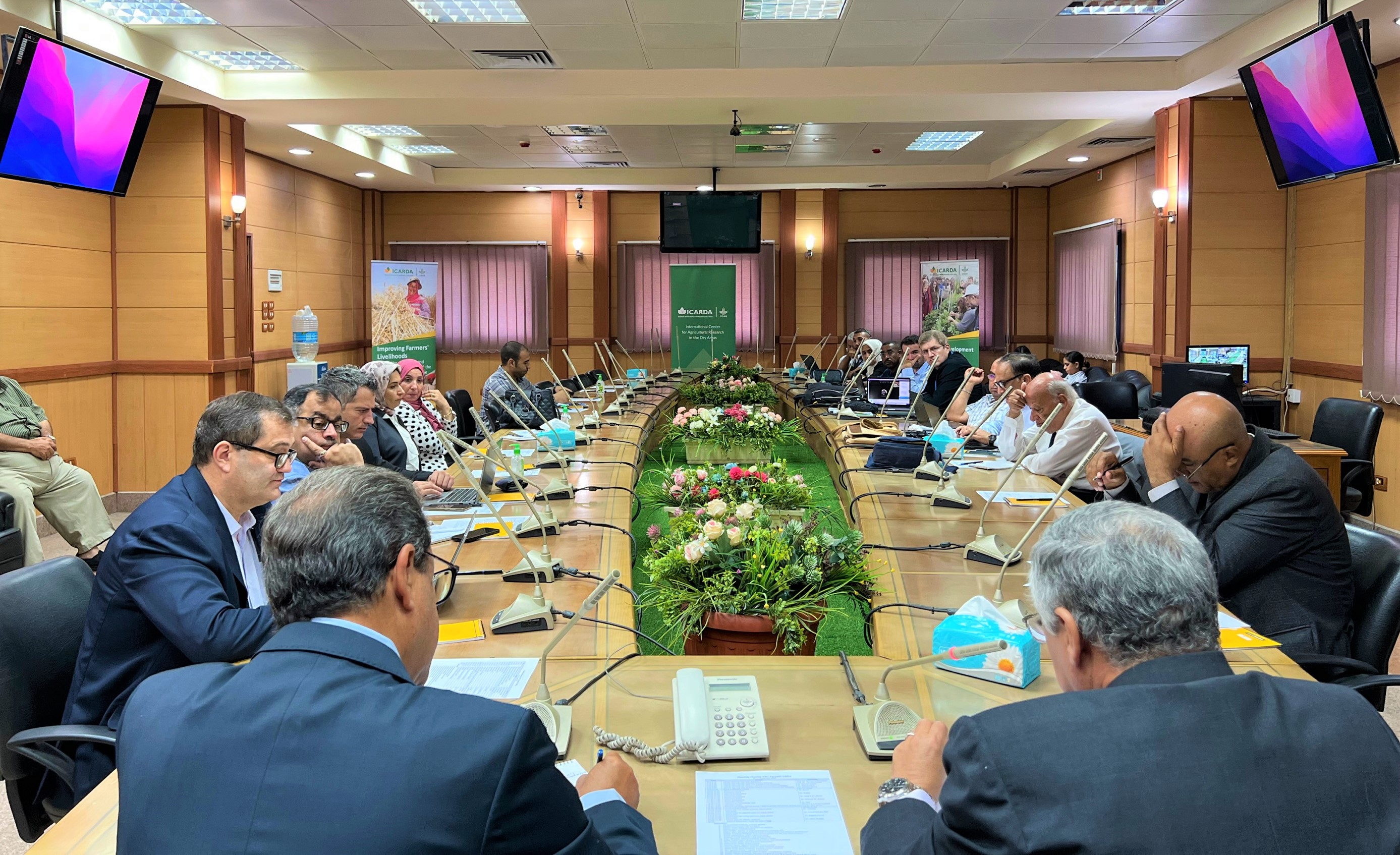ICARDA AND ARC-EGYPT 2022 ANNUAL PLANNING MEETING

Each year, the Agricultural Research Center (ARC) in Egypt and ICARDA delegations meet to assess the achievements of the previous year, discuss lessons learned, plan Egypt's future agricultural research priorities and renew collaborative commitments that align with the national strategic plan for Egypt in agricultural development.
The collaboration between ICARDA and ARC in Egypt was launched more than 40 years ago. Our joint research covers the development of climate-smart crop varieties of wheat, barley, and food legumes tolerant to soil salinity and resistant to drought stress, pests, and diseases, as well as advancing adequately developed and tested solutions for water shortage.
This year, on September 8, ICARDA Director General, and CGIAR CWANA Regional Director, Mr. Aly Abousabaa, along with Dr. Aladdin Hamwieh, Regional Coordinator for the Nile Valley and the Red Sea Program, and a delegation of ICARDA experts and team leaders, met with officials from ARC led by Dr. Mohammad Soliman, President of ARC-Egypt, to review and reflect on the achievements of the collaboration project's outcomes during its third phase (2020-2022) and discuss the agricultural research priorities in Egypt over the next three years.
The most significant achievements over the past three years include:
-
The screening of Orobanche-tolerant faba bean among 1200 lines was introduced to Egypt.
-
The evaluation of combined large seed lines and Orobanche resistance in F6.
-
The validation of crop lines tolerant to heat, drought, earliness, and Orobanche.
-
Crossing Egyptian lines with early disease resistance, heat tolerance, and FBNYV.
-
Seed multiplication of successful lines and dissemination to other partners.
-
The identification and validation of two promising early, heat-tolerant lines.
-
The release of a new chickpea variety named "Sids 101" in 2022.
-
Enhanced water-use efficiency using innovative water-saving techniques such as gated pipes and thermal imaging-based irrigation scheduling.
-
The development of a new on-farm water-energy-food (WEF) nexus indicator to assess the performance of different Egyptian crop production systems for their water, energy, CO2, and food production footprint.
-
The development of drought-tolerant barley genotypes under rain-fed conditions.
-
The development of high-yielding barley genotypes under different stress conditions in newly reclaimed lands (under irrigated conditions).
-
The dissemination of transferrable innovations "Innovation Platform" in barley.
-
The screening of barley genotypes for salt tolerance. Lysimeter has established a demonstration for salt tolerance screening.
However, due to the escalating impact of climate change, the Russia-Ukraine crisis, increasing urbanization, and the nation's explosive population expansion - now over 110 million people, Egypt still faces agricultural difficulties.
"It is essential to highlight that soil salinity, water shortages, and heat are still pressing issues in Egypt. High on our agricultural research agenda is the production of tolerant crops and exploring alternative crops that can grow under extremely challenging environments," said Dr. Mohamed Soliman, ARC-Egypt President. "Through our joint research with ICARDA, we have identified crops that require much less water and can still grow in saline soil. Generally, integrating innovative agricultural practices into farming has proved to help farmers minimize vulnerability to and adapt to global shocks as well as domestic hardships."

The ARC and the Ministry of Agriculture and Land Reclamation are ICARDA's leading partners in implementing research projects in Egypt related to sustainable development, food security, and water and land management.
"It is important to examine interrelationships between factors at different scales to understand the effects of climate change on more than only the physical aspects of food, land, and water systems, such as food imports, agricultural yields, water availability, and environmental degradation. The collaboration between scientists and policymakers is a crucial step toward food security," said Mr. Abousabaa, ICARDA Director General and CGIAR CWANA Regional Director.
The discussions highlighted the interconnectedness of our food, land, and water systems and thus, the outcomes of the meeting included a plan to:
-
Evaluate elite wheat genotypes, faba bean, chickpea, lentil, and barley.
-
Increase seeds of the new genotypes.
-
Fast-track super early lentils and chickpeas in existing cropping systems.
-
Evaluate machine harvestable and herbicide-tolerant lentil.
-
Evaluate grasspea lines in saline-prone environments: Moghra.
-
Conduct training sessions, field days, demonstrations, and workshops for Ph.D. students.
-
Introduce nano-biochar for enhancement of soil and plant properties under saline conditions.
-
Introduce irrigation scheduling based on proximal thermal imaging.
-
Develop, test, and validate on-farm water management practices for enhancing water productivity and building resilience in major cropping systems.
-
Introduce new varieties of cactus to Egypt.
ICARDA is now looking forward to the next phase of this productive partnership with ARC to meet the country's needs and develop crop varieties and new innovative approaches in Egypt through One CGIAR CWANA initiatives that aim to deliver more impact through pooled agricultural research-for-development in the region.
Meeting Attendees:
Aly Abousabaa (ICARDA), Director General
Mohammad Soliman (ARC), President
Michael Baum (ICARDA), DDG-R
Rida Kamber (ARC), Director of Field Crop Research Institute
Aladdin Hamwieh (ICARDA), Regional Coordinator for the Nile Valley program
Rehab Abdelrahman (ARC), Legume Breeder
Maalouf, Fouad (ICARDA), Faba Bean Breeder
Degu, Wuletaw Tadesse (ICARDA), Wheat Breeder
Sherif Thabet (ARC), Director of Sids Station and Wheat Breeder
Hiba Gomaa (ARC), Head of Barley Department
Khairy Amer (ARC), Barley Breeder
Sanchez Garcia, Miguel (ICARDA), Barley Breeder
Vinay Nangia (ICARDA), Head of the Water Research Program
Mohie El Din Omar (ICARDA), Scientist (Water Research)
Shiv Agrawal Kumar (ICARDA), Legume Coordinator
Sawsan Hassan (ICARDA), Scientist, Rangeland Ecology and Forages
Rashad Abou Ainain, Former director of Field Crop Research Institute
